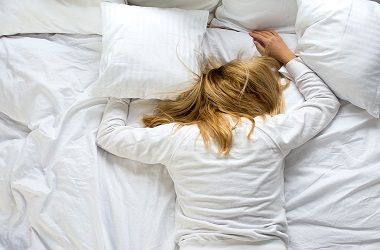General Health
Why Is Oversleeping Bad for You?
5 min read
By Apollo 24|7, Published on - 27 December 2022, Updated on - 04 January 2025
Share this article
0
4 likes

Don't we all enjoy sleeping? However, we sometimes oversleep, especially on weekends, without considering the health implications. In this article, we'll look at why you shouldn't sleep too much.
Why Do People Oversleep?
Experts believe that our modern lifestyle, in which we all juggle several responsibilities, is directly conflicting with our health. Because of this, an individual receives a lesser amount of sleep and may wish to acquire that extra sleep during the weekends or even weekdays, which creates an oversleeping habit.
However, if you examine it closely, oversleeping can be caused by a number of diseases, like depression or thyroid disorders. On the other hand, it can be induced by certain medicines. Although oversleeping may be a symptom, it is important to remember that it is best to seek help and only sleep the hours recommended by specialists.
On the other hand, a person may have ‘hypersomnia,’ which affects approximately 2% of people in the world. To function properly, hypersomnias require 10 to 12 hours of sleep per night. Common symptoms include regularly snoozing during the day without feeling revived, nodding off frequently when eating or conversing, and oversleeping at night. If you have any of these symptoms, speak with one of our pulmonologists to learn more about the underlying causes right away.
How Much Sleep Do You Need?
Sleep has an important role in many physical, cognitive, and psychological processes, and it appears that sleeping properly is a health necessity, even if it is not necessary for survival.
Although the amount of sleep you get each day is crucial, other components of your sleep also contribute to your health and well-being. Check out this table to see how much sleep you require every day based on your age group.
Age Group | Sleep Hours |
Middle Childhood (6 - 12 years) | 9 - 12 hours |
Adolescent (13 - 18 years) | 8 - 10 hours |
Adults (19 - 60 years) | 7 - 8 hours |
Seniors (61+ years) | 7 - 9 hours |
Check out this blog for some tips on getting a good night's sleep by naturally raising your melatonin levels. Click here.
Why Shouldn’t You Oversleep?
Oversleepers (who are non-hypersomnias) have been dubbed "long-sleepers" by health experts. Long sleepers (who sleep more than 10 hours) were shown to be much more likely to develop psychiatric illnesses and a higher body mass index (BMI) in the long run, according to one study.
💡 Did You Know?
Long sleepers had considerably higher levels of obesity (BMI>30) and overweight (BMI>25) than normal sleepers.
Oversleeping can cause migraines, obesity, diabetes, back pain, heart disease, and other problems. You can prevent oversleeping now that we've proven that it's harmful for you by
1. Having a Sleep Schedule
You might get started right away. Go to sleep at 10 p.m. without fail, and try to avoid all forms of devices. Why? These seemingly innocent devices emit blue light, which interferes with our bodies' natural creation of sleeping chemicals known as melatonin.
On the other side, make sure your draperies are open and your nightlights are turned off. Once you've established this routine, your body will become adapted to the new sleeping pattern and, most importantly, you will avoid taking long naps during the day.
💡 Did You Know?
Your risk for stress, mood swings, diabetes, and heart disease is reduced with a regular sleep routine.
2. Exhausting Your Body
Along with dragging yourself to a strict sleeping schedule, you can also exhaust your body by exercising. Yes, after you've reached home after work, you can work out on a treadmill or stationary bike. You can even go out for a brisk walk.
When you put your body to work, it raises its temperature. Once you finish working out, your body's temperature falls back to normal, consequently encouraging your body to get ready to sleep.
💡 Did You Know?
According to research, daily exercise is a natural cure for acute insomnia.
3. Using Aromatherapy
Aromatherapy is also recommended by experts to help you sleep better because it improves the quality of your sleep. You can use lavender or sweet marjoram essential oils, both of which contain chemicals that help you sleep.
💡 Did You Know?
In one such study, 64% of participants reported that using essential oils improved their sleep quality.
4. Getting Some Sunlight
Right after you get up, try to catch some sunlight for 15-20 minutes! Why? It modifies your circadian rhythm, allowing you to sleep during the night.
💡 Did You Know?
Sunlight increases sleep quality, sleep state, and sleep patterns by increasing endogenous melatonin secretion.
How to Treat Oversleeping?
If you've done everything on this list to prevent oversleeping, we advise you to speak with our pulmonologists to get a thorough understanding. After consulting with the doctors, you may undergo a sleep test. Consult our specialists today to learn more!
💡 Did You Know?
A sleep study, commonly known as polysomnography, is a comprehensive study used to diagnose sleep disorders. During the study, it tracks your eye and leg movements as well as your heart rate, blood oxygen level, and respiration. It is typically performed in a sleep centre, but it can also be performed at home.
Final Note
We get how, on occasion, we would try to snooze our clock to gain a little extra sleep, but over time, we inevitably form a negative habit of oversleeping. Why not avoid oversleeping now that you've read this blog and taken note of these best practises? Book a physical or online consultation with one of our pulmonologists today if you need any additional advice.
Medically Reviewed by Dr. Dhanunjay Reddy B
General Health
Consult Top Sleep Medicine Specialists
View AllLeave Comment
Recommended for you

General Health
Uric Acid Test: Purpose, Procedure, Range, and Results
Uric Acid Test helps diagnose gout, kidney disease & other conditions. Learn about its normal range, procedure, purpose, and how to interpret results.

General Health
Vitamin B12: Frequently Asked Questions
Vitamin B12 is an essential nutrient that is required for the production of healthy blood and nerve cells.

General Health
Which Is The Best Oil For Cooking?
Your cooking oil can affect your health adversely. Read to know which oil is best for cooking.
Subscribe
Sign up for our free Health Library Daily Newsletter
Get doctor-approved health tips, news, and more.
Visual Stories

Could There Be More to Your Snore?
Tap to continue exploring
Recommended for you

General Health
Uric Acid Test: Purpose, Procedure, Range, and Results
Uric Acid Test helps diagnose gout, kidney disease & other conditions. Learn about its normal range, procedure, purpose, and how to interpret results.

General Health
Vitamin B12: Frequently Asked Questions
Vitamin B12 is an essential nutrient that is required for the production of healthy blood and nerve cells.

General Health
Which Is The Best Oil For Cooking?
Your cooking oil can affect your health adversely. Read to know which oil is best for cooking.



